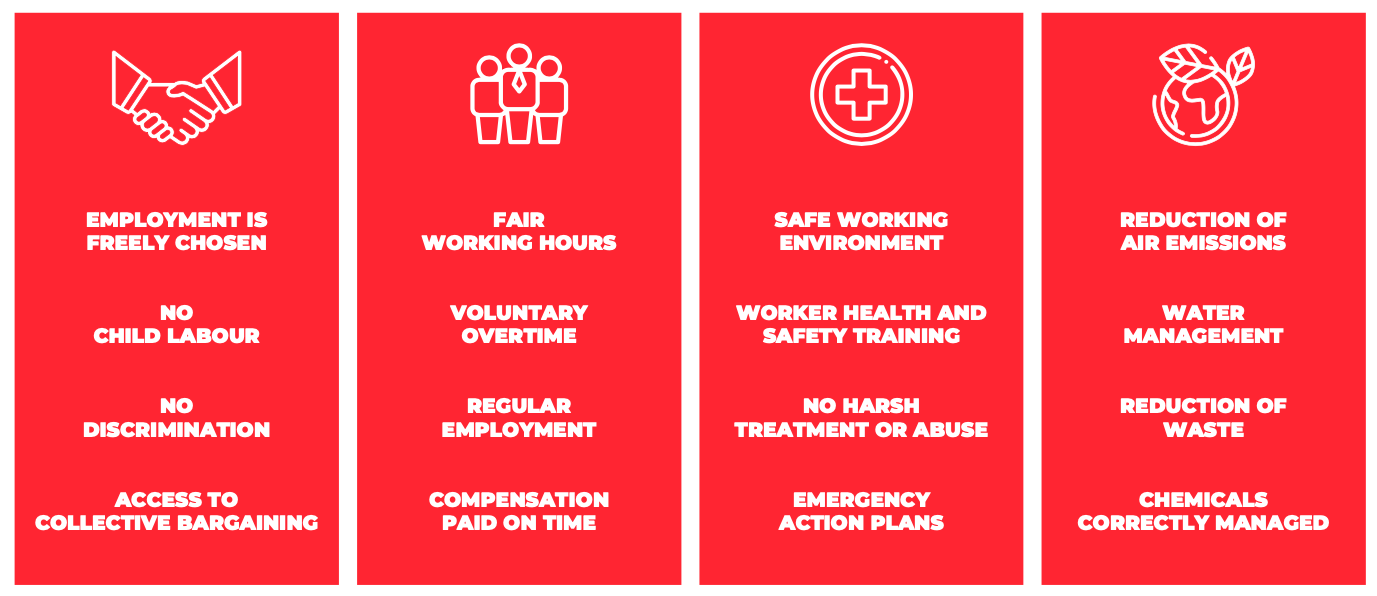
The School Locker is committed to identifying and addressing modern slavery risks to ensure we maintain responsible and transparent supply chains. The School Locker understands that collaboration with our supply chain partners is vital to ensuring continuous improvement.
Our Supply Chain Code of Conduct is been based on the standards set out by the Ethical Trade Initiative (ETI) and the International Labour Organisation (ILO) conventions. The ETI Base code is a globally recognised benchmark for good labour practices.
This code defines labour standards that aim to achieve safe, fair, legal and humane working conditions for everyone working in our supply chain.
Companies applying this code are expected to comply with national and other applicable law and, where the provisions of law and this Code address the same subject, to apply that provision which affords the greater protection.
School Locker Supply Chain Code of Conduct at a Glance

Quick Links:
1. Employment is freely chosen.
3. Working conditions are safe and hygienic.
4. Child labour shall not be used.
6. Working hours are not excessive.
7. No discrimination is practised.
8. Regular employment is provided.
9. No harsh or inhumane treatment is allowed.
10. Environmental impacts and restricted substances are managed correctly.
Monitoring, adherence, and enforcement.
1. Employment is freely chosen.
1.1 There must be no use of forced, bonded or involuntary prison labour.
1.2 Workers must not be required to lodge “deposits” or their identity papers
with their employer and must be free to leave their employer after reasonable notice.
2. Freedom of association.
2.1 Workers, without distinction, have the right to join or form trade unions of their own choosing and to bargain collectively.
2.2 The employer adopts an open attitude towards the activities of trade unions and their organisational activities.
2.3 Workers representatives are not discriminated against and have access to carry out their representative functions in the workplace.
2.4 Where the right to freedom of association and collective bargaining is restricted under law, the employer facilitates, and does not hinder, the development of parallel means for independent and free association and bargaining and the right to collective bargaining are respected and an effective workers grievance mechanism implemented.
3. Working conditions are safe and hygienic.
3.1 A safe and hygienic working environment shall be provided, bearing in mind the prevailing knowledge of the industry and of any specific hazards. Adequate steps shall be taken to prevent accidents and injury to health arising out of, associated with, or occurring in the course of work, by minimising, so far as is reasonably practicable, the causes of hazards inherent in the working environment.
3.2 Workers shall receive regular and recorded health and safety training, and such training shall be repeated for new or reassigned workers.
3.3 Access to clean toilet facilities and to potable water, and, if appropriate, sanitary facilities for food storage shall be provided.
3.4 Accommodation, where provided, shall be clean, safe, and meet the basic needs of the workers.
3.5 The company observing the code shall assign responsibility for health and safety to a senior management representative.
4. Child labour shall not be used.
4.1 There shall be no new recruitment of child labour.
4.2 Companies shall develop or participate in and contribute to policies and programs which provide for the transition of any child found to be performing child labour to enable her or him to attend and remain in quality education until no longer a child; “child” and “child labour” being defined in the appendices.
4.3 Children and young persons under 18 shall not be employed at night or in hazardous conditions.
4.4 These policies and procedures shall conform to the provisions of the relevant ILO standards.
5. Living wages are paid.
5.1 Wages and benefits paid for a standard working week meet, at a minimum, national legal standards or industry benchmark standards, whichever is higher. In any event wages should always be enough to meet basic needs and to provide some discretionary income.
5.2 All workers shall be provided with written and understandable Information about their employment conditions in respect to wages before they enter employment and about the particulars of their wages for the pay period concerned each time that they are paid.
5.3 Deductions from wages as a disciplinary measure shall not be permitted nor shall any deductions from wages not provided for by national law be permitted without the expressed permission of the worker concerned. All disciplinary measures should be recorded.
6. Working hours are not excessive.
6.1 Working hours must comply with national laws, collective agreements, and the provisions of 6.2 to 6.6 below, whichever affords the greater protection for workers. 6.2 to 6.6 are based on international labour standards.
6.2 Working hours, excluding overtime, shall be defined by contract, and shall not exceed 48 hours per week*
6.3 All overtime shall be voluntary. Overtime shall be used responsibly, taking into account all the following: the extent, frequency and hours worked by individual workers and the workforce as a whole. It shall not be used to replace regular employment. Overtime shall always be compensated at a premium rate, which is recommended to be not less than 125% of the regular rate of pay.
6.4 The total hours worked in any 7 day period shall not exceed 60 hours, except where covered by clause 6.5 below.
6.5 Working hours may exceed 60 hours in any 7 day period only in exceptional circumstances where all of the following are met:
This is allowed by national law;
This is allowed by a collective agreement freely negotiated with a workers’ organisation representing a significant portion of the workforce;
Appropriate safeguards are taken to protect the workers’ health and safety; and
The employer can demonstrate that exceptional circumstances apply such as unexpected production peaks, accidents or emergencies.
6.6 Workers shall be provided with at least one day off in every 7 day period or, where allowed by national law, 2 days off in every 14 day period.*
International standards recommend the progressive reduction of normal hours of work, when appropriate, to 40 hours per week, without any reduction in workers’ wages as hours are reduced.
7. No discrimination is practised.
7.1 There is no discrimination in hiring, compensation, access to training, promotion, termination or retirement based on race, caste, national origin, religion, age, disability, gender, marital status, sexual orientation, union membership or political affiliation.
8. Regular employment is provided.
8.1 To every extent possible work performed must be on the basis of recognised employment relationship established through national law and practice.
8.2 Obligations to employees under labour or social security laws and regulations arising from the regular employment relationship shall not be avoided through the use of labour-only contracting, subcontracting, or home-working arrangements, or through apprenticeship schemes where there is no real intent to impart skills or provide regular employment, nor shall any such obligations be avoided through the excessive use of fixed-term contracts of employment.
9. No harsh or inhumane treatment is allowed.
9.1 Physical abuse or discipline, the threat of physical abuse, sexual or other harassment and verbal abuse or other forms of intimidation shall be prohibited.
10. Environmental impacts and restricted substances are managed correctly.
10.1 Suppliers shall comply with all applicable environmental laws and regulations, including but not limited to air emissions, solid and hazardous waste storage and disposal, energy usage and water consumption and discharge.
10.2 Suppliers shall adopt measures to mitigate negative impacts of operations on the environment.
10.3 Suppliers are encouraged to make progressive improvements in the environmental performance of their operations, including but not limited to the responsible use of natural resources, reduction of waste, energy efficiency, and cleaner production methods.
10.4 Supplier demonstrates a consistent and competent approach to restricted substance management, supported by an effective and legally compliant chemicals management program.
Compliance Audits.
All Suppliers are required to hold current social compliance audit certification.
Suppliers are required to conduct a SEDEX SMETA (4-Pillar) audit of all factories used for manufacturing.
Suppliers are required to submit the summary of findings to The School Locker and work on all areas of non-conformaity with a corrective action plan.
Suppliers are also encouraged to complete the Oeko-TEX 100 standard certification for environmental sustainability.
Monitoring, adherence, and enforcement.
Suppliers shall implement this Code of Conduct and all accompanying policies and procedures into their operations and submit to monitoring and verification.
Suppliers shall take all necessary steps to ensure that their subcontractors and component suppliers adhere to this Code of Conduct.
Suppliers shall post this Code of Conduct in the language(s) of their employees in visible and accessible locations in their facilities and train employees on their rights and obligations according to this Code of Conduct and applicable laws.
Suppliers shall allow relevant monitoring, adherence, and enforcement personnel and/or any of its authorized representatives or agents unrestricted access to all facilities and all relevant records at all times, whether or not notice is provided in advance.







